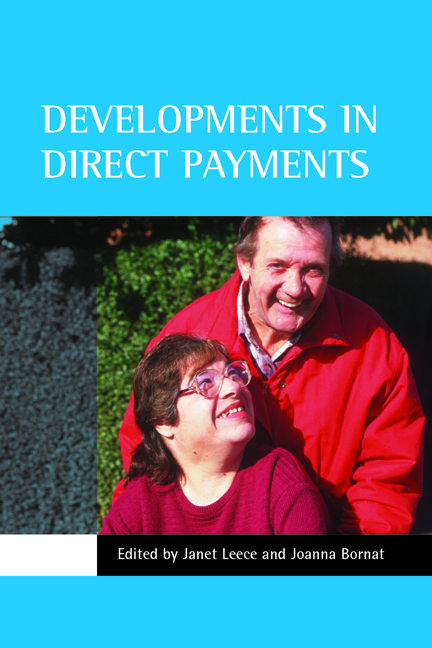Book contents
seven - “Direct what?” Exploring the suitability of direct payments for people with mental health problems
Published online by Cambridge University Press: 18 January 2022
Summary
This chapter considers direct payments made to people with mental health problems. It examines this in the context of findings from a study commissioned by the Scottish Executive involving the author (Ridley and Jones, 2002), which explored the feasibility of direct payments to people labelled as ‘mental health service users’ (including those with dementia). The research investigated the implementation of direct payments across Scotland, and whether mental health service users were being encouraged to access them. It explored mental health service users’, carers’ and professionals’ opinions about the idea of direct payments, any concerns or perceived obstacles, and the support that might be needed. Take-up of direct payments by people with mental health problems was found to be minimal in Scotland, as in the rest of the UK, although the work of the National Pilot in England and development work commissioned by Direct Payments Scotland (DPS) has started to change this. A degree of flexibility will clearly be required of direct payment schemes and support organisations, both initially to establish willingness to accept payments, as well as to manage the responsibilities of, for example, being an employer, if direct payments are to become more widely available.
The term ‘mental health service users’ was used in the research and was intended to cover disability from mental illness including dementia. In this chapter, the term ‘people with mental health problems’ is also used to cover a vast array of conditions as diverse as depression, anxiety, phobias, eating disorders, schizophrenia, and also dementia. Terminology in this field is fraught with difficulties, particularly in light of changes in legislation and understanding of mental health problems, and especially with respect to the notion of ‘incapacity’. In Scotland, the 2000 Adults with Incapacity (Scotland) Act incorporated into law for the first time the notion that ‘incapacity’ is not a fixed state. Echoing this, Hasler et al (1999) have argued that being ‘willing’ or ‘able’ to accept and to manage a direct payment are not fixed states but rather these are determined by the amount of support (that is, information or assistance) available to the individual.
Research background
Previous research had found that direct payments are rarely offered to mental health service users and that the majority of direct payments are made to people who are physically disabled.
- Type
- Chapter
- Information
- Developments in Direct Payments , pp. 95 - 110Publisher: Bristol University PressPrint publication year: 2006

